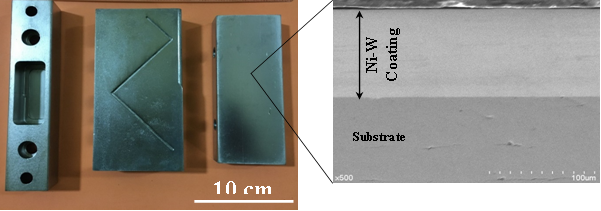Technology is available for transfer, for a new method of deposition of Nickel alloy coatings on high-performance materials in engineering applications can replace environmentally toxic chrome coatings. The coatings obtained are also highly corrosion-resistant and useful for the plastic ware industry.
With ever-increasing demand for high-performance materials in engineering applications, nano-crystalline coatings can cater to the need for the replacement of environmental hazardous chrome coatings.
Chrome coatings have been used in plastic bottling industry to improve the service life of die-casting components. However, chrome plating is a toxic process, and the stringent standard permissible exposure limit (PEL) for toxic hexavalent chromium and all its compounds has to be complied in all chrome plating industrial workplaces. Finding a procedure for adhering to this limit is a challenge for scientists.
Scientists at the Centre for Engineered Coatings at International Advanced Research Centre for Powder Metallurgy & New Materials (ARCI), an autonomous Research and Development Centre of the Department of Science and Technology (DST), Govt. of India, has developed a lab-scale process to deposit novel nanostructured Nickel alloy coatings. The process uses pulsed current electroplating, which is environmentally benign with high production capacity. In contrast to conventional, direct current used for chrome plating, the research group led by Dr. Nitin P. Wasekar at ARCI have used electric current in the form of pulses of duration of a few milliseconds for electroplating purpose.
The process consists of environment-friendly electrolyte consisting of nickel and tungsten ions that is the source of strengthening elemental tungsten (W) and nickel (Ni). The pulsed current is applied between the components to be coated, acting as cathode and non-consumable anode.
The pulsed current effect was used for nano-crystalline coatings wherein high instantaneous current density for very small duration resulted in high rate of nucleation. Unlike in conventional direct current plating, the coatings were virtually porosity free, crack free with minimal hydrogen uptake. The use of pulsed current resulted in the nano-crystallization of nickel tungsten alloy coatings with high hardness (700-1200 HV) and wear resistance. The coatings were extremely corrosion resistance and could withstand up to 700 hrs of salt spray.
The coatings developed at ARCI can withstand temperatures up to 500°C without thermal softening and can improve the life of die components by at least two times than conventional chrome plating. They were successfully applied to die-casting components used in plastic bottling industry, wherein the temperatures at the die interface can be over 280°C. With numerous applications in automotive, defense, and aerospace for these coatings, the process know-how is ready for transfer as a replacement for conventional chrome plating.
For more details, contact:
Dr. Nitin P Wasekar, Email: nitin@arci.res.in
ALSO READ: low cost iron aluminide coating, high performance thermo-electric material, making bricks from construction waste, seaweed farming – lucrative business opportunity, Rs 15,000 e-cycle technology



